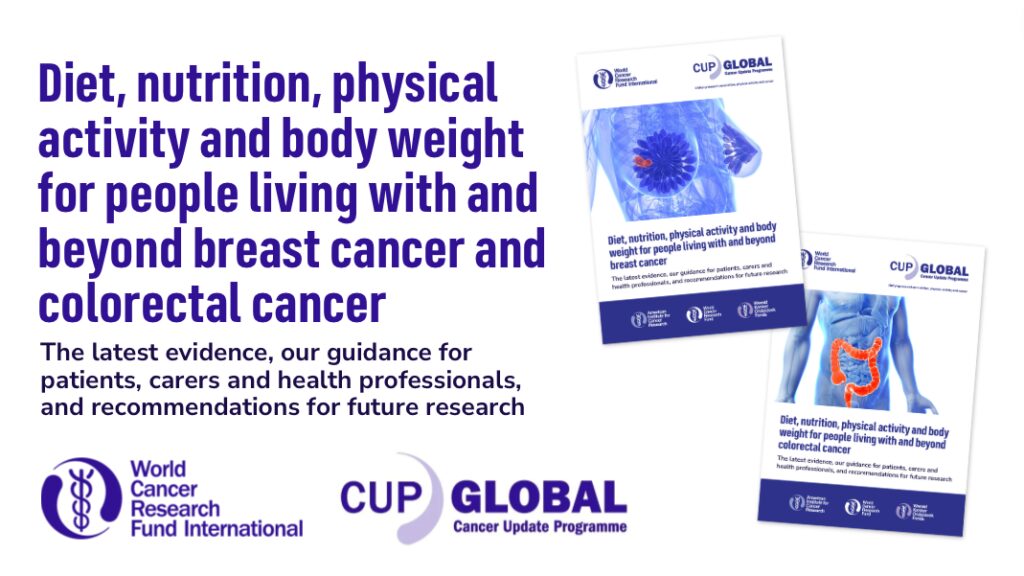Eating more ultra-processed food (UPF) may be associated with a higher risk of developing cancers of the upper aerodigestive tract (including mouth, throat and oesophageal cancers), according to a new study funded by World Cancer Research Fund and led by researchers from the University of Bristol and the International Agency for Research on Cancer (IARC).
The authors of this international study, which analysed diet and lifestyle data on 450,111 adults who were followed for approximately 14 years, say obesity associated with the consumption of UPFs may not be the only factor to blame. The study was published in the European Journal of Nutrition.
Selected coverage of this research
- Obesity may not be the only factor to link ultra-processed foods to higher risk of mouth, throat and esophagus cancers – Medical Xpress
- Eating too many ready meals could raise your risk of at least three types of cancer by almost 25%, study suggests – The Sun
- Foods children eat every day linked to throat and mouth cancer – Bristol Post and Wales Online
Several studies have shown a link between UPF and cancer, including a recent study which looked at the association between UPFs and 34 different cancers in the UK Biobank.
As many UPFs have an unhealthy nutritional profile, researchers from the Bristol Medical School and IARC sought to establish whether the association between UPF consumption and head and neck cancer and oesophageal adenocarcinoma (a cancer of the oesophagus) could be explained by an increase in body fat.
Results showed that eating 10% more UPF is associated with a 23% higher risk of head and neck cancer and a 24% higher risk of oesophageal adenocarcinoma in the largest cohort study in Europe, the European Prospective Investigation into Cancer and Nutrition cohort. Increased body fat only explained a small proportion of this statistical association.
Growing pool of evidence on UPF
Dr Helen Croker, World Cancer Research Fund’s Assistant Director of Research and Policy, said:
This study adds to a growing pool of evidence suggesting a link between UPF and cancer risk. The association between a higher consumption of UPF and an increased risk of developing upper-aerodigestive tract cancer supports our Cancer Prevention Recommendations to eat a healthy diet, rich in wholegrains, vegetables, fruit and beans.
Fernanda Morales-Berstein, the study’s lead author, said:
UPFs have been associated with excess weight and increased body fat in several observational studies. This makes sense, as they are generally tasty, convenient and cheap, favouring the consumption of large portions and an excessive number of calories. However, it was interesting that in our study the link between eating UPFs and upper-aerodigestive tract cancer didn’t seem to be greatly explained by body mass index and waist-to-hip ratio.
The authors suggest that other mechanisms could explain the association. For example, additives including emulsifiers and artificial sweeteners which have been previously associated with disease risk, and contaminants from food packaging and the manufacturing process, may partly explain the link between UPF consumption and upper-aerodigestive tract cancer in this study.
George Davey Smith, Professor of Clinical Epidemiology and Director of the MRC Integrative Epidemiology Unit at the University of Bristol, and co-author on the paper, said:
UPFs are clearly associated with many adverse health outcomes, yet whether they actually cause these, or whether underlying factors such as general health-related behaviours and socioeconomic position are responsible for the link, is still unclear.
Further research is needed to identify other mechanisms, such as food additives and contaminants, which may explain the links observed.
However, based on the finding that body fat did not fully explain the link between UPF consumption and upper-aerodigestive tract cancer risk in this study, Morales-Berstein said:
Focusing solely on weight loss treatment, such as Semaglutide, is unlikely to greatly contribute to the prevention of upper-aerodigestive tract cancers related to eating UPFs.

Sign up to hear more from us
Get the latest cancer prevention-related news and updates straight to your inbox
We welcome these new evaluations by the International Agency for Research on Cancer and the World Health Organization on the health effects of the artificial sweetener, aspartame. The evidence reviewed led to the classification of aspartame as ‘possibly carcinogenic’, but also confirmed that the current recommended acceptable daily intake of aspartame will not change.
Our cancer prevention recommendation to limit consumption of sugar sweetened drinks, and to drink mostly water and unsweetened drinks, is consistent and remains appropriate in light of these evaluations. Following this, along with our other Recommendations, will give people the best chance of avoiding a preventable cancer.
We will continue to advocate for better research in these areas, in order to strengthen our understanding of how diet, nutrition, physical activity and body weight influence cancer risk.
We support the recommendations that future research should focus on well-conducted studies to better understand the relationship between aspartame and cancer risk and for more mechanistic studies to explore potential biological pathways.
> Find the link to the CO-CREATE Supplement in Obesity Reviews here
The new Obesity Reviews, published today, presents a set of novel methods used by the CO-CREATE project to give young people a voice in policy and research as part of efforts to take a more systems-based approach to childhood obesity prevention. This is complemented by papers presenting a set of new tools developed to benchmark national policy action on physical activity and nutrition.
World Cancer Research Fund International, in collaboration with the Norwegian Institute of Public Health, worked to develop novel methods for monitoring, benchmarking, and evaluating relevant policies. Three papers were written on the processes and challenges of benchmarking national government action on nutrition and physical activity across Europe, using the NOURISHING and MOVING databases and indexes.
The findings of the NOURISHING and MOVING policy indexes will be launched in during 2 webinars in March 2023.
Read more about the newly-launched CO-CREATE Supplement.
| Paper | Lead author |
|---|---|
| Scan of physical activity policy actions in Europe: Lessons learned from populating the MOVING database | Oldridge-Turner, K |
| The development of the NOURISHING and MOVING benchmarking tools to monitor and evaluate national governments’ nutrition and physical activity policies to address obesity in the European region | Vlad, I |
| Pilot testing of the NOURISHING policy index – assessing governmental nutrition policies in five European countries | Fismen, A.S |














